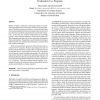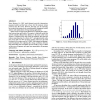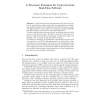142 search results - page 4 / 29 » Predictable programming on a precision timed architecture |
103
click to vote
POPL
1994
ACM
15 years 5 months ago
1994
ACM
Modern computer architectures increasingly depend on mechanisms that estimate future control flow decisions to increase performance. Mechanisms such as speculative execution and p...
104
Voted
NIME
2004
Springer
15 years 7 months ago
2004
Springer
Auracle is a “group instrument,” controlled by the voice, for real-time, interactive, distributed music making over the Internet. It is implemented in the JavaTM programming l...
221
click to vote
POPL
2007
ACM
16 years 2 months ago
2007
ACM
Reuse distance (i.e. LRU stack distance) precisely characterizes program locality and has been a basic tool for memory system research since the 1970s. However, the high cost of m...
116
click to vote
IDA
2009
Springer
15 years 8 months ago
2009
Springer
Abstract Deciding which computer architecture provides the best performance for a certain program is an important problem in hardware design and benchmarking. While previous approa...
106
click to vote
EUC
2006
Springer
15 years 5 months ago
2006
Springer
Certain hard real-time tasks demand precise timing of events, but the usual software solution of periodic interrupts driving a scheduler only provides precision in the millisecond ...



